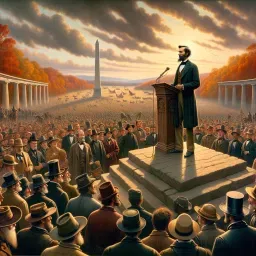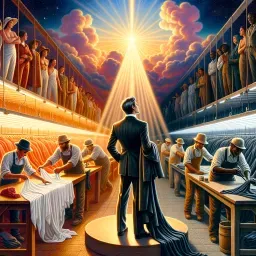A pound of pluck is worth a ton of luck

- Meaning
- This phrase means that having courage, perseverance, and determination ("pluck") is much more valuable than relying on luck to achieve success. In life, those who actively pursue their goals with grit and resolve are more likely to achieve their objectives than those who passively wait for good fortune to come their way. It highlights the importance of taking action and being proactive rather than depending on chance.
- Allegory
- In the image, the brave warrior represents the "pound of pluck," while the faded symbols of luck (a four-leaf clover and a horseshoe) signify that luck is lesser compared to hard work. The arduous path with cliffs and steep climbs illustrates the challenges one faces, requiring determination and effort to overcome. The bright light symbolizing the inner fire captures the essence of courage and resilience. The clearing sky in the background reflects that, despite obstacles, perseverance will ultimately lead to success.
- Applicability
- In personal life, this phrase can be a motivator to tackle challenges head-on and to work diligently towards one's goals rather than waiting for things to happen on their own. For example, preparing thoroughly for an exam is better than hoping for easy questions to appear, or consistently working on a project is superior to waiting for a lucky break. It encourages a mindset of self-reliance and accountability.
- Impact
- The impact of this phrase has resonated throughout American culture, especially in the realms of education and personal development. It is often cited in motivational contexts, emphasizing the American ethos of self-determination and the "can-do" spirit. It aligns with the broader cultural appreciation of meritocracy, where individual effort and perseverance are valued.
- Historical Context
- James A. Garfield served as President of the United States from March 4, 1881, until his assassination later that year. The phrase likely originated from this period, during which he advocated for various civil service reforms and upheld the importance of integrity and hard work.
- Criticisms
- Criticisms of this phrase could arise from perspectives that recognize the role of systemic barriers and privileges in achieving success. Critics might argue that emphasizing "pluck" over "luck" overlooks the significant advantages or disadvantages conferred by one's socio-economic background, education, and other factors beyond individual control.
- Variations
- Variations of this phrase exist in different cultures, reflecting local idioms but maintaining the same core idea—that effort and determination are more valuable and reliable than luck. For instance, in Japanese culture, a similar sentiment is captured through the proverb “Fall seven times, stand up eight,” emphasizing resilience and perseverance.
-

I may be president of the United States, but my private life is nobody's damn business.
-

He serves his party best who serves the country best.
-

The only thing we have to fear is fear itself.
-

Fourscore and seven years ago our fathers brought forth on this continent, a new nation, conceived in Liberty, and dedicated to the proposition that all men are created equal.
-

A public office is a public trust.
-

The goal to strive for is a poor government but a rich people.
-

Yesterday is not ours to recover, but tomorrow is ours to win or lose.
-

No president who performs his duties faithfully and conscientiously can have any leisure.
-

I pity the man who wants a coat so cheap that the man or woman who produces the cloth will starve in the process.
-

What is right and what is practicable are two different things.
-

Battle not with monsters, lest ye become a monster, and if you gaze into the abyss, the abyss gazes also into you.
-

Citius, altius, fortius.
No Comments